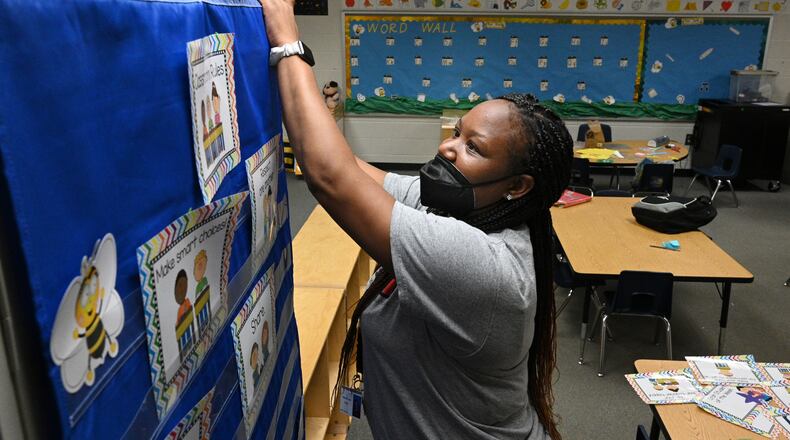A new report echoes what Georgia educators have long lamented: Teaching has lost its luster.
The working paper from the Annenberg Institute for School Reform at Brown University charts the state of the U.S. K-12 teaching profession over the last half century by examining prestige, interest among students, preparation for entry and job satisfaction. The damning conclusion: The current state of the teaching profession is at or near its lowest levels in 50 years.
America’s 3.7 million K-12 teachers were affected by the COVID-19 pandemic and increased partisan polarization in education. “The onset of the global pandemic and the introduction of laws restricting instruction and banning books that address issues of racism and sexuality, for example, have influenced both public perceptions of the profession and teachers’ day-to-day experiences on the job,” notes “The Rise and Fall of the Teaching Profession: Prestige, Interest, Preparation, and Satisfaction over the Last Half Century.”
Among the troubling trends cited in the report:
A 2022 survey of U.S. households this year found that only 18% of respondents reported being likely to encourage their child or another younger person to become a K-12 teacher.
Data from the nationally representative American Educator Panels shows teacher stress and burnout have risen appreciably during the pandemic years and are meaningfully higher than levels experienced by the broader population of working adults.
Between 2018 and 2022, the percentage of teachers who say teaching is still worth it despite its stress and disappointments has declined from 72% to 44%. (A report this year from the Georgia Department of Education’s Teacher Burnout Task Force described a classroom workforce overwhelmed and exhausted by testing, time demands and unrealistic expectations.)
Georgia has undertaken some of the recommendations in the Annenberg report, including improving teacher pay. But, even with Gov. Brian Kemp’s $5,000 increase, salaries remain below national averages. The state hasn’t done much to restore prestige. A Republican-led General Assembly devoted 2022 to culture war laws that cast teachers as adversaries, erode their autonomy and challenge their professional judgment.
A panel sponsored Wednesday by the Southern Regional Education Board, an interstate education compact of 16 Southern states, highlighted promising efforts to bolster the beleaguered profession, including the Blueprint for Maryland’s Future Act of 2021. The blueprint sets forth a comprehensive plan to boost teacher starting salaries in Maryland to $60,000 by 2026, incentivize teachers to take on more responsibility and extend the new teacher induction period.
“If we can raise the status of the profession, the more people are going into it,” said panelist and Maryland state Sen. Paul Pinsky, chair of the state Senate’s Education, Health and Environmental Affairs Committee. “Finally, and this might seem counterintuitive, when you set a high standard and you up the ante, you increase the number of people who want to pursue it.”
Mississippi convened an Education Human Capital Task Force to address teacher workforce needs. “As a result of this task force, we really lifted the whole compensation piece,” said Carey Wright, who served as Mississippi superintendent for nine years until her retirement this year and oversaw its much-acclaimed advances in reading. “We had the largest pay raise in our history to be very competitive with those states around us. It has to be a priority for everyone. It can’t just be a priority for the Department of Education.”
Public Impact Co-President Bryan Hassel said there have been increasing demands on teachers without commensurate support. “We have to think big and beyond our current structures. Go for something that gives every student an excellent teacher and every educator a career where they are supported and guided.”
A public policy group focused on improving education, Public Impact advocates revamping the standard model of one teacher/one classroom to a team-based situation, where teachers with proven records lead the teams. Such team models are dynamic, collaborative and more rewarding and supportive of a teacher’s daily life, said Hassel.
Several blue-ribbon commissions in Georgia have pondered how best to improve teaching and learning, but the resulting reports were often boxed away when a new political regime won power. The challenge, said SREB President Stephen Pruitt, is to unite across politics around a shared and enduring vision for Georgia’s future that can outlast shifts in power.
“When you look at Maryland and Mississippi, they have had huge gains,” he said. “Part of what both states did is embrace this idea that you are planting a tree whose shade you may never sit under.”
About the Author
The Latest
Featured



